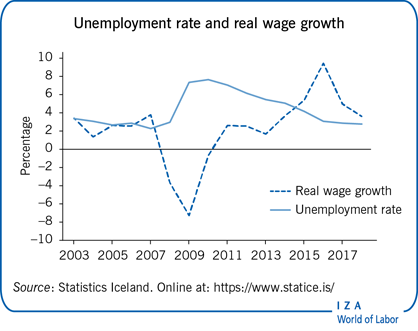Elevator pitch
The Icelandic labor market is characterized by high union density and the Icelanders’ willingness to work, as labor force participation is high, the work week long, and people retire late. The resilience and flexibility of the Icelandic labor market was put to the test in the Great Recession as a large share of employees in the labor market experienced a fall in work hours and a fall in nominal wages, while unemployment rose less than expected. In recent years there has been a strong influx of foreign workers, mostly from Eastern Europe. Studies have shown that their labor force participation is no lower than that of Icelanders.

Key findings
Pros
The labor market is functioning well with a high level of employment and low levels of unemployment, with active participation of immigrants.
The labor market recovered quickly following the Great Recession; wage levels have recovered and unemployment is almost down to pre-recession levels.
Long-term unemployment and youth unemployment are down to pre-recession levels, indicating limited long-term effects of the recession.
Income inequality was growing prior to the crisis, but fell during it, leaving Iceland with the lowest Gini coefficient among OECD countries.
Cons
There is an increased risk of education mismatch as a growing share of the population attends tertiary education, disproportionally women, while job creation has in recent years largely been in the blue-collar service sector.
Robust economic growth led to a shortage of labor which was supplemented through immigration, often using temporary work agencies, which brought an increased risk of social dumping.
Real wage growth in recent years has been in excess of growth in productivity, leading to inflationary pressures and a deterioration of Iceland’s competitive position.